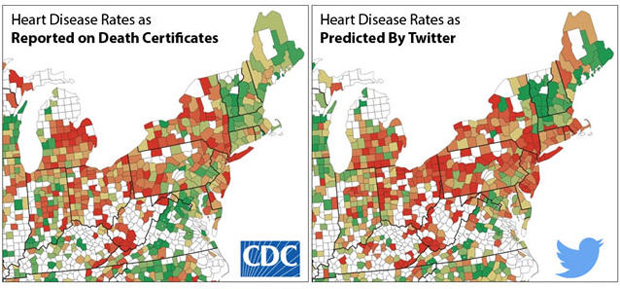Cheerful tweets may mean a healthier heart
Crowd-sourcing through social media has quickly become one of the most powerful tools for public health. Platforms such as Twitter, Facebook and Yelp have been used to track influenza, HIV, food poisoning and other ailments. Now, a new report shows that Twitter can also help predict rates of heart disease on a hyper-local level.
According to new research published in Psychological Science, a journal of the Association for Psychological Sciences, simply tracking the expression of negative emotions, including anger, stress and fatigue, may produce an accurate picture of which communities are most likely to have high incidences of heart disease.
Their snapshot (pictured above right) looks strikingly similar to the analysis of heart disease data by the U.S. Centers for Disease Control and Prevention.
A number of previous studies have shown emotions and behavior are closely tied to one's risk for coronary heart disease. Expressions of happiness and joy have been linked to lower rates of heart attack.
"Psychological states have long been thought to have an effect on coronary heart disease," co-author Margaret Kern, of the University of Melbourne in Australia, said in a press statement. "For example, hostility and depression have been linked with heart disease at the individual level through biological effects. But negative emotions can also trigger behavioral and social responses; you are also more likely to drink, eat poorly and be isolated from other people which can indirectly lead to heart disease."
For the study, Kern and her team looked at public tweets published between 2009 and 2010. They analyzed the use of words that reflected emotions and behavior that may be triggered by strong feelings. The data involved 1,300 U.S. counties containing 88 percent of the country's population.
Counties where tweets included a lot of four-letter expletives, words like "hate" and other negative language were found to have higher rates of coronary heart disease than those where positive language -- words such as "wonderful" or "friends" -- was more common.
The authors say using Twitter may be an accurate litmus test for public health, because researchers are not restricted to only collecting data through a limited number of questions created for a study. Using social media is also a cost-effective means for collecting data.
"Twitter seems to capture a lot of the same information that you get from health and demographic indicators," co-author Gregory Park said in a press statement. "But it also adds something extra. So predictions from Twitter can actually be more accurate than using a set of traditional variables."
